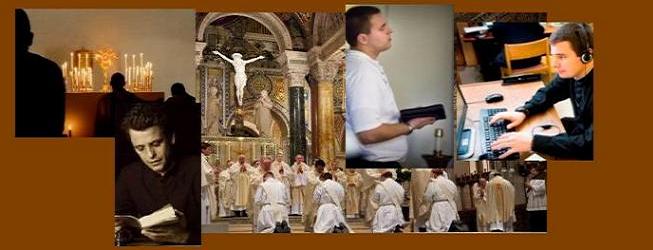In Pastores Dabo Vobis, Blessed John Paul II offered to those charged with seminary formation the framework by which to form men for the priesthood, namely, the four pillars of priestly formation: spiritual, intellectual, apostolic and human formation.
I am a practical man when it comes to the spiritual life. My own spiritual journey has been marked by ordinary, mundane experiences in prayer and liturgy, and that is fine. Actually, it is more than fine, I prefer it that way. I prefer to “trust in the slow work of God,” as Teilhard de Chardin would say. And yet, daily, I present myself before Our Lord in the Blessed Sacrament, offering that first hour of the day, with the conviction that this is the best place for me to be, that my fidelity to that hour is pleasing to the Lord and fruitful for me. I think St. Thomas Aquinas would say that to trust in that slow work of God results in virtue, “the habitual and firm disposition to do the good.”
Seminary programs are guided by the fundamental principles expressed in Blessed John Paul II’s Apostolic Exhortation, Pastores Dabo Vobis,” (I Will Give You Shepherds, PDV) and the Program of Priestly Formation (PPF) of the USCCB. In Pastores Dabo Vobis, Blessed John Paul II offered to those charged with seminary formation the framework by which to form men for the priesthood, namely, the four pillars of priestly formation: spiritual, intellectual, apostolic and human formation. These four guiding principles operate together with a beautiful complementarity and interplay, enhancing the desired goals of each individual pillar. It is important to recognize the goals specific to each area while appreciating their interdependence. This is clearly recognized in PDV and the PPF. Paragraph 73 of the PPF states: “Spiritual formation informs the other three. Intellectual formation appropriates and understands the other three. Pastoral formation expresses the other three pillars in practice.” Pastores Dabo Vobis, paragraph 57 states “The whole formation imparted to candidates for the priesthood aims at preparing them to enter into communion with the charity of Christ the Good Shepherd.” What I purposely left out of the quote above from the PPF is the reference to human formation, “Clearly human formation is the foundation for the other three pillars.” (PPF 73) In order to have an authentic, integrated approach to the formation of future priests, and a thorough implementation of the goals specific to the remaining three pillars, the role of human formation must be appreciated. Again, Blessed John Paul II acknowledged this point in paragraph 45 of PDV, “Human formation…leads to and finds its completion in spiritual formation.”
The goals of spiritual formation are clearly outlined. Reflecting the work of Pope Paul VI as expressed in Optatiam Totius, PVD outlines the three-fold work of “faithful meditation on the Word of God, active participation in the Church’s holy mysteries and the service of charity…” (48) These aspects of spiritual formation are further outlined in the PPF, focusing on a whole list of spiritual practices, including the Holy Eucharist, Penance, Liturgy of the Hours, spiritual direction, lectio divina, retreats, personal meditation, solitude, simplicity and apostolic outreach. After listing these practices, paragraph 111 of the PPF states “The development of sound and lasting habits and attitudes in the spiritual life is a challenging process. “ I would add that this development of habits and attitudes has just as much to do with human formation as it does spiritual formation, if not more. The daily schedule of Holy Mass, the Divine Office, meditation etc., assumes something prior, that the seminarian has the necessary self-discipline and maturity to recognize these moments as good for him, and then conforming his life to them. A college seminarian recently wrote in his self-evaluation “I have really stopped thinking that time is my own…” This is a momentous realization in the area of human formation for a college seminarian. He is no longer thinking about himself, but rather how his choices, especially his use of time, have greater consequences. This is a positive step in affective maturity, self-discipline, self-direction, and personal responsibility. Only with such growth in human formation, the “foundation” for the other three pillars, can spiritual formation—“the core which unifies and give life to his being a priest and his acting as a priest” (PDV 45)—occur.
Again, I am a practical man when it comes to the spiritual life. It has often been said that 90 percent of the spiritual life is simply showing up. I believe in that principle. Get out of bed, and make it down to chapel on time. Not because the director is telling you to be there, but because you have come to realize the virtue in such a mundane decision. Only then will spiritual formation, the “heart” of the matter, be able to build on a firm human foundation.

This is a wonderful, focused summary not just for the seminary but also for our laity and our Catholic schools. This is great material for the pulpit. Thank you Bishop Rice!
Yes Bishop Rice has given a solid and true write on a seminary education and formation. I am positive the seminarians in St. Louis will greatly benefit from it.